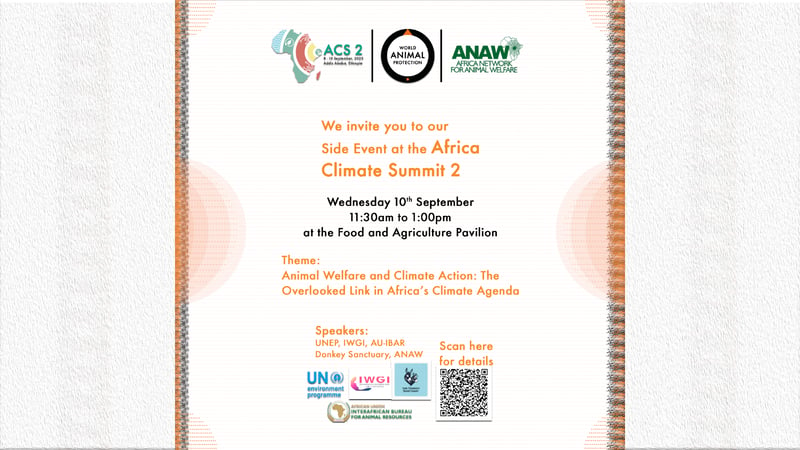
Animal Welfare and Climate Action: The Overlooked Link
News
Climate discussions often revolve around emissions from factories, vehicles and energy systems. Yet a significant contributor to global warming lies in a less visible sector: the way we raise and manage animals.
Industrial livestock systems generate large amounts of methane, drive deforestation for feed production and depend on antibiotics that seep into ecosystems. At the same time, animals are sentient beings that deserve humane treatment. Recognising this connection, Animal Welfare and Climate Action: The Overlooked Link seeks to bring animal welfare into the climate conversation at the Africa Climate Summit.
Date and Venue
The session is scheduled for 10 September 2025 from 11.30 AM to 1.00 PM Eastern Africa Time, at the Agriculture & Food Systems Pavilion in Addis Ababa. Organised by World Animal Protection, in collaboration with the Africa Network for Animal Welfare, The Donkey Sanctuary, the United Nations Environment Programme and the African Union Interafrican Bureau for Animal Resources, the session aims to shed light on a dimension of climate action that is often ignored.
Why Animal Welfare Matters for the Climate
Industrial livestock production is responsible for significant methane and nitrous oxide emissions. Large herds of cattle, pigs and poultry kept in confined spaces produce more waste than natural systems can absorb. This waste releases potent greenhouse gases into the atmosphere. Additionally, vast swaths of forest are cleared to grow soy and maize for animal feed, leading to biodiversity loss and carbon release. By contrast, humane farming practices, where animals have space to graze, feed is grown locally, and natural behaviours are respected, result in healthier animals and lower emissions. Such systems rely less on antibiotics, reducing the risk of antimicrobial resistance, and often integrate with agroecological cropping patterns that restore soils.
Key Topics to Be Addressed
Rethinking Food Systems
Speakers will examine how food systems can transition to models that prioritise animal welfare. This includes adopting plant rich diets and reducing dependence on animal products. Plant based meals have a smaller carbon footprint and reduce pressure on land and water resources. By encouraging diversified diets, countries can enhance nutrition and reduce emissions simultaneously.
Nature Positive Livestock Practices
Not all animal agriculture is harmful. There are systems that mimic natural ecosystems, such as rotational grazing and silvopastoral farming. These approaches allow animals to forage under tree cover, promoting carbon sequestration and protecting wildlife habitats. During the session, examples from African contexts will illustrate how pastoral communities and smallholders have applied these methods successfully.
Policy and Investment Frameworks
Transforming food systems requires supportive policies and investments. The session will discuss how governments can set targets to cap industrial livestock expansion, incentivise agroecological research and provide subsidies for humane farming. International financiers and development partners will be urged to prioritise projects that align with animal welfare and climate goals. The integration of animal welfare into nationally determined contributions and national adaptation plans will also be highlighted.
Expected Outcomes
Participants will leave with a clearer understanding of why animal welfare is integral to effective climate action. They will gain practical knowledge on humane and nature positive livestock systems and how to advocate for their adoption. The session aims to foster alliances across sectors, encouraging policymakers, researchers and civil society to work together. By making the case for animal welfare within climate strategies, the event seeks to broaden the definition of sustainability and inspire more holistic approaches.